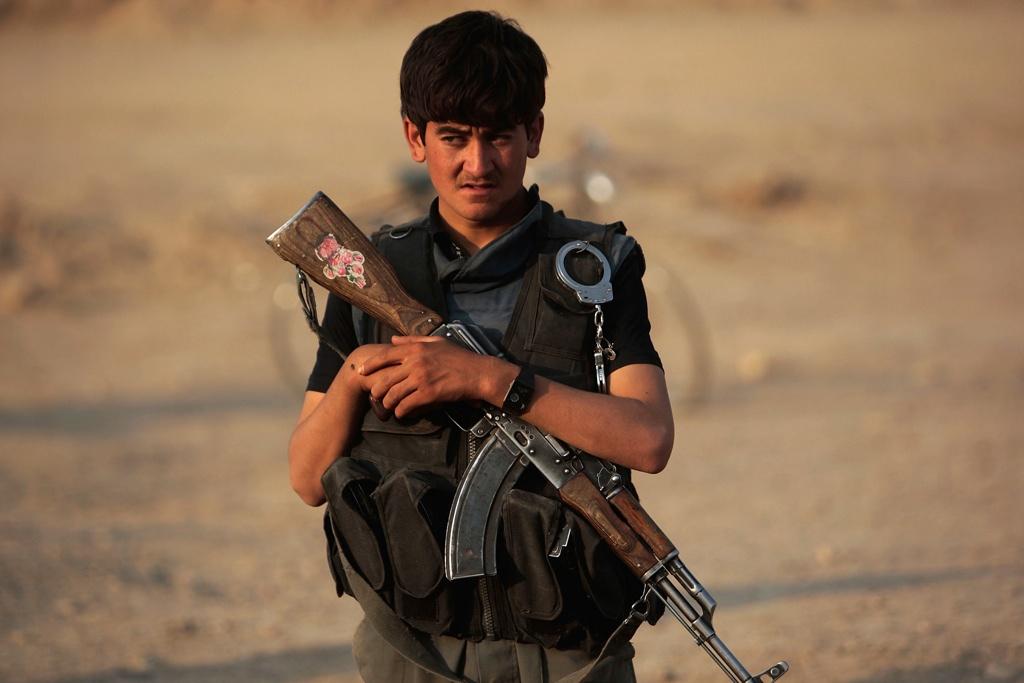In Afghanistan, US borrows strategy from Iraq
A young member of the Afghan National Police guards the perimeter of a meeting among Afghan Pashtun tribal elders in the Kandahar province of Afghanistan.
KABUL, Afghanistan — Abdul Jabar Farhad used to be just another illiterate old mujahideen commander living off past glories in Afghanistan's countryside. Now he is at the forefront of a controversial project that has become a litmus test for NATO's exit strategy.
His band of 150 men is part of the nationwide Local Police program, funded by the United States, that arms and pays village forces to defend rural areas from the Taliban.
The scheme is inevitably compared to the US-sponsored Awakening Councils in Iraq, where tribal groups were successfully mobilized against Al Qaeda. Here, however, few people are convinced it will work.
Amid growing accusations of violence and criminality, the feeling among many Afghans is that these militias are destined to run wild and cause the kind of chaos their predecessors unleashed when the Soviets left in 1989.
More from GlobalPost: Afghan schoolgirls caught in the crossfire
Farhad was an insurgent back then, battling the Russians in the mountains and fields near Kabul. He ran a division of fighters in the civil war that followed and later opposed the Taliban regime.
After the struggle against the American-led occupation took hold in his home district of Nijrab, Kapisa province, a construction company approached him to protect a road in the area from guerrilla attacks. He agreed and said he continues to have the support of residents.
"People encouraged us to stand against the Taliban,” he said. “Therefore we stood up, God helped us, we got this work and we kicked them out.”
Last year Farhad and his men went on to join the Local Police. According to him, they were given 15 days training at a French NATO base and are paid about $200 a month.
“The Taliban are fighting very fiercely,” he said. “They are very strong compared to the government.”
Like the Iraqi Awakening Councils, the Afghan militia program was the brainchild of David Petraeus, former head of NATO troops here and now director of the CIA.
Launched in 2010, it was a crucial aspect of his much-hyped counter-insurgency doctrine, which advocated the use of local paramilitaries as a way of winning hearts and minds.
Petraeus once described the Local Police as “an important addition to the overall campaign” that is “in essence, a community watch with AK-47s.”
More from GlobalPost: Afghans fear conflict will escalate after US departs
The ultimate goal is to have 30,000 members nationwide who will eventually be disarmed or absorbed into the conventional security forces when conditions allow.
But there are clear signs that the program has begun to take on a life of its own, adding to a deep suspicion of the militias that already existed.
Farhad himself spoke warily of a second Local Police commander in Nijrab who fought for a rival faction in the past and he predicted the outbreak of a new civil war in Afghanistan in the future.
He also told GlobalPost he was equipped only with simple Kalashnikovs, even though a politician from Kapisa claimed to have provided him with heavy machine guns and rocket-propelled grenade launchers.
Noor Mohammad Kafeel Noori, a member of Afghanistan’s senate, described supplying Farhad with the weapons and called the militias a "choice between bad and worse," saying they may prove to be thieves but they were still better than the Taliban.
In other areas of the country, meanwhile, the Local Police have been accused of abusing their power and terrorizing villagers.
Men from one unit in the northern province of Kunduz were recently detained for the apparent abduction and rape of a girl. Elsewhere, allegations of common criminality are rife.
All of this has reminded Afghans of a history they would rather forget. In the 1980s, pro-regime militias were established to quell the mujahideen’s insurgency, only for some to later switch allegiance and play a vital role in bringing down the government in Kabul.
More from GlobalPost: Obama in Kabul: What he didn't tell us
From 1992 to 1996 the country was then split into a series of competing fiefdoms and tens of thousands of civilians were killed. Vowing to impose law and order, the Taliban movement first emerged as a direct result of the chaos.
A Human Rights Watch report published last year said the Local Police program was “a high-risk strategy to achieve short-term goals.”
President Hamid Karzai is known to have had strong concerns about the plan but relented under pressure from Petraeus and the United States. Many here believe it is a mistake he will come to regret.
Shahnawaz Tanai was defense minister in the Soviet-backed communist administration and he fears an escalation in the conflict is inevitable if the foreign troops leave as scheduled at the end of 2014.
With the government powerless, militias will join forces with warlords and politicians from the north, he predicted, and fight against the Taliban in the south for control of the nation.
“Your 10 years of effort will be for nothing,” he said.
We rely on support from listeners and readers like you to keep our stories free and accessible to all. Monthly gifts are particularly meaningful because they help us plan ahead and concentrate on the stories that matter. Will you consider donating $10/month, so we can continue bringing you The World? Donations made between now and Dec. 31 will be matched 1:1. Thanks for investing in our work!
